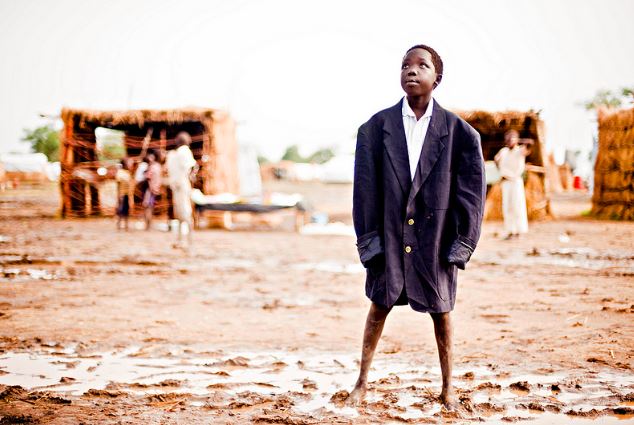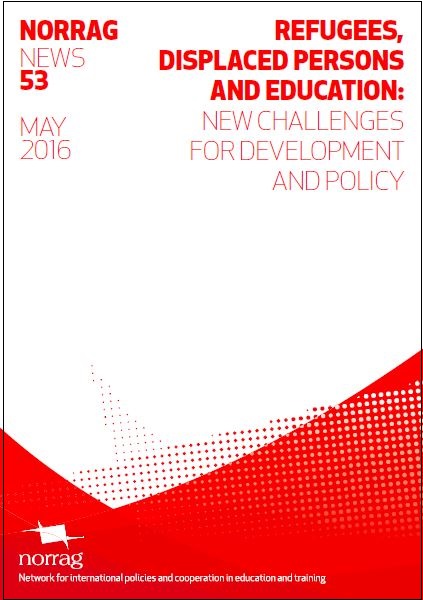Refugees, Displaced Persons and Education: New Challenges for Development and Policy By Kenneth King
By Kenneth King, Editor NORRAG News.
>>NORRAG NEWS 53 on ‘Refugees, Displaced Persons and Education’ – is now online
The greatest humanitarian emergency in over 70 years
 On 23rd May 2016 the UN Secretary General convened the first ever World Humanitarian Summit in Istanbul to discuss ways to reform the global humanitarian system as the world faces the greatest humanitarian emergency in over 70 years.
On 23rd May 2016 the UN Secretary General convened the first ever World Humanitarian Summit in Istanbul to discuss ways to reform the global humanitarian system as the world faces the greatest humanitarian emergency in over 70 years.
Throughout the Summit the conversation often turned to the 75 million school-age children living in crisis-affected countries, who are in desperate need of educational support.
Not so hidden now in Europe. Never so hidden in the Global South
When the Education for All (EFA) Global Monitoring Report (GMR) of 2011 focused on The Hidden Crisis: Armed Conflict and Education, its focus was not principally with refugees at all, but with the massively deleterious effect of conflict on education. Arguably, the refugee crisis now affecting Europe has made this hidden crisis dramatically more open for Europe’s population, though this crisis has not been at all hidden for those states neighbouring conflict. The World Economic Forum (WEF) of 2016 has argued that ‘top of the list of risks of highest concern …by a considerable margin, was large-scale involuntary migration’. Put another way, migration’s sudden impact on the front-line states of Europe and on the main European destinations, Germany and Sweden, has brought into the open and into focus the millions of refugees already located in refugee camps and in host communities in countries surrounding Syria, Somalia, Afghanistan, Palestine etc. In other words, the great burden of support for refugees and displaced persons has been long carried by countries of the Global South, with the assistance of the international relief agencies.
Involuntary migration and education
The latest (53rd) issue of NORRAG News (NN53), which is now available for free online, draws attention to many different dimensions of refugees, displaced persons and education, but it is not focused on economic migration or on migration for higher education per se, but on what the WEF calls ‘involuntary migration’ and its connections with education.
‘Refugees’ and internally displaced people (IDPs) -‘almost every education challenge possible’
Benavot’s telling phrase (NN53) points to the enormity of the education and skills situation faced by refugees. The fine words of Sustainable Development Goal 4 about ensuring inclusive and equitable quality education and … lifelong learning opportunities are a world away from the daily realities of the education accessible to refugee and internally displaced children. Access, mainstreaming, medium of instruction, certification, accreditation, lack of trained teachers, double-shift schooling, lack of security, ghettoization, language training, progression to higher education, second chance education, and skills development are all hugely demanding where schooling and training are even actually available to refugee and IDP families. The utilisation of skills and knowledge are dependent on access to local labour markets which is another substantial hurdle in many host countries.
Refugees and (Western) media focus
Amongst NN53’s many concerns are the way that the sheer scale of the refugee crisis has captured Western media and political attention. The reports of the possibility of reaching Germany or Sweden have translated into a once-in-a-lifetime chance of gaining access to Europe with its perceived education, employment and welfare opportunities. By contrast in the countries such as Lebanon and Jordan where almost one in five and one in seven persons respectively in the entire population is a refugee, the crisis caught media attention years ago.
The contested role of aid to refugees in the North versus poverty relief in the South
Discussions are ongoing about whether Europe’s bilateral aid agencies as well as the European Commission, the UN agencies and the World Bank will need to rethink their development cooperation to take account of the costs of supporting genuine refugees and asylum seekers in Europe. Debate and contestations abound about the use of development aid to cover the new and relatively large costs of supporting the minority of global refugees in OECD countries over the last year of expanded refugee migration. The claim, for instance in Norway, is that almost 20% of its recently expanded aid budget is going to cover refugee budget items such as language courses, child care for unaccompanied minor asylum seekers, and grants to municipalities that settle refugees etc (Koffeld & Brynildsen, NN53). This makes the costs of refugees in the North parallel the long-standing debate about whether the imputed costs of scholarships to Southern students into countries such as Germany, Japan and France can be counted as development aid (See recent GMRs). There are similar concerns in Germany and the Nordic countries more generally about how helping refugees in Europe should not remove funding from urgent poverty alleviation in the South (Boger & Ghawami, NN53) or from development and area studies institutions in the North (Melber, NN53). Will aid budgets need to be restructured to ensure that they are spent on what DFID calls the great global challenges – such as the root causes of mass migration? Will humanitarian aid need to be rethought so that education constitutes more than the present 2%?
Crucial role of education in protracted refugee settings
There are huge differences between what can be called the protracted refugee crises such as that of the Palestinians, still located in camps around the Middle East, including in Syria, more than 65 years after their flight, on the one hand, and the expulsion of the Uganda Asians in 1972, for example, where no one has been in a camp for ages, on the other. The difference in educational expenditure is massive, since UNWRA is still supporting some 500,000 displaced Palestinian school children in its schools across the Middle East region as well as many as 7,000 TVET students.
Lost generation, lost generations
The sheer scale of the Syrian crisis, on the very borders of Europe, like the Balkans before it, demands special attention. Syria, a country with a long-standing tradition of compulsory education, now has millions of its young people out of secure, full-time schooling. There is talk of a lost generation, almost the de-schooling of Syria.
But one of the other outcomes of the widespread concern about Syria’s ‘lost generation’ has been the rise of awareness about many other potentially ‘lost generations’ across the world. Most of these are in crisis-affected countries, but they are by no means all refugee and IDP children who make up the 75 million children who are ‘in the most desperate need of educational support’ (ODI, 2016). There are also potentially lost generations in countries that are not affected by conflict. The value of advocacy around ‘No lost generation’ and ‘Education cannot wait’ is that they focus the aid and policy constituencies around particular targets. The other vitally important part of any response is recognizing the role of what may be called ‘communities of resilience’. These have not waited for aid funds to set up schools, both formal and informal, and to organize support facilities. But the articles here vividly illustrate that these local community groups, local councils, local religious groups, and NGOS will be a crucial part of any aid platform or initiative. And most critical of all are the many different cultures and contexts of resilience amongst the refugee and IDP children themselves and their families.
 >> View the full list of articles in NN53 on ‘Refugees, Displaced Persons and Education: New Challenges for Development and Policy’
>> View the full list of articles in NN53 on ‘Refugees, Displaced Persons and Education: New Challenges for Development and Policy’
Kenneth King is a Professor Emeritus in the School of Social and Political Studies and in the School of Education in Edinburgh University. He is also the Editor of NORRAG News.
> >View all NORRAG Blogs on refugees/migration, ODA and Agenda 2030
NORRAG (Network for International Policies and Cooperation in Education and Training) is an internationally recognised, multi-stakeholder network which has been seeking to inform, challenge and influence international education and training policies and cooperation for almost 30 years. NORRAG has more than 4,500 registered members worldwide and is free to join. Not a member? Join free here.
